The Intel Skylake-X Review: Core i9 7900X, i7 7820X and i7 7800X Tested
by Ian Cutress on June 19, 2017 9:01 AM ESTBenchmarking Performance: CPU Encoding Tests
One of the interesting elements on modern processors is encoding performance. This includes encryption/decryption, as well as video transcoding from one video format to another. In the encrypt/decrypt scenario, this remains pertinent to on-the-fly encryption of sensitive data - a process by which more modern devices are leaning to for software security. Video transcoding as a tool to adjust the quality, file size and resolution of a video file has boomed in recent years, such as providing the optimum video for devices before consumption, or for game streamers who are wanting to upload the output from their video camera in real-time. As we move into live 3D video, this task will only get more strenuous, and it turns out that the performance of certain algorithms is a function of the input/output of the content.
HandBrake H264 and HEVC
As mentioned above, video transcoding (both encode and decode) is a hot topic in performance metrics as more and more content is being created. First consideration is the standard in which the video is encoded, which can be lossless or lossy, trade performance for file-size, trade quality for file-size, or all of the above can increase encoding rates to help accelerate decoding rates. Alongside Google's favorite codec, VP9, there are two others that are taking hold: H264, the older codec, is practically everywhere and is designed to be optimized for 1080p video, and HEVC (or H265) that is aimed to provide the same quality as H264 but at a lower file-size (or better quality for the same size). HEVC is important as 4K is streamed over the air, meaning less bits need to be transferred for the same quality content.
Handbrake is a favored tool for transcoding, and so our test regime takes care of three areas.
Low Quality/Resolution H264: He we transcode a 640x266 H264 rip of a 2 hour film, and change the encoding from Main profile to High profile, using the very-fast preset.
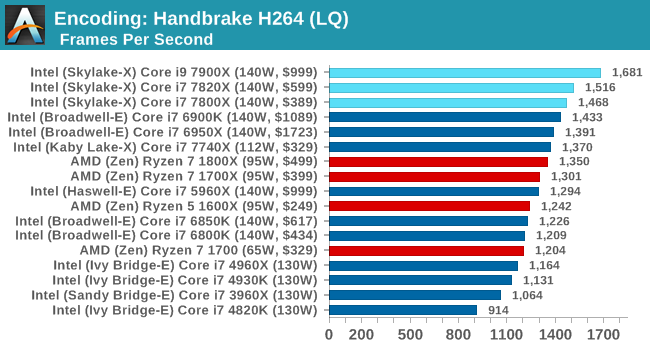
More cores, more frequency, more IPC, more fun: the Core i9-7900X wins here, and even the i7-7800X wins out against the Core i7-6900K.
High Quality/Resolution H264: A similar test, but this time we take a ten-minute double 4K (3840x4320) file running at 60 Hz and transcode from Main to High, using the very-fast preset.
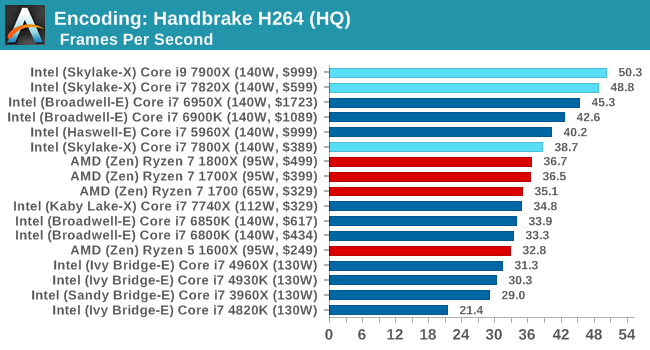
Moving into HQ mode means making the job more parallel, so the higher core counts stay at the top of the chart.
HEVC Test: Using the same video in HQ, we change the resolution and codec of the original video from 4K60 in H264 into 4K60 HEVC.
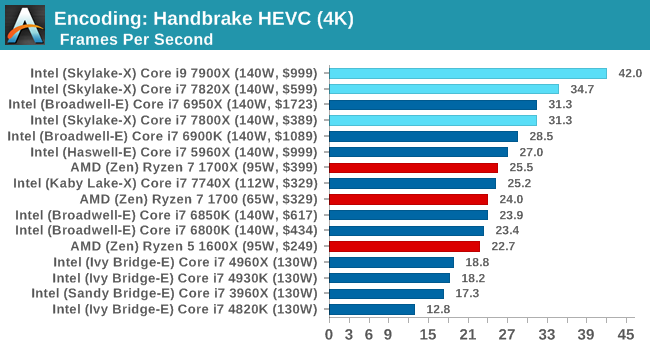
WinRAR 5.40
For the 2017 test suite, we move to the latest version of WinRAR in our compression test. WinRAR in some quarters is more user friendly that 7-Zip, hence its inclusion. Rather than use a benchmark mode as we did with 7-Zip, here we take a set of files representative of a generic stack (33 video files in 1.37 GB, 2834 smaller website files in 370 folders in 150 MB) of compressible and incompressible formats. The results shown are the time taken to encode the file. Due to DRAM caching, we run the test 10 times and take the average of the last five runs when the benchmark is in a steady state.
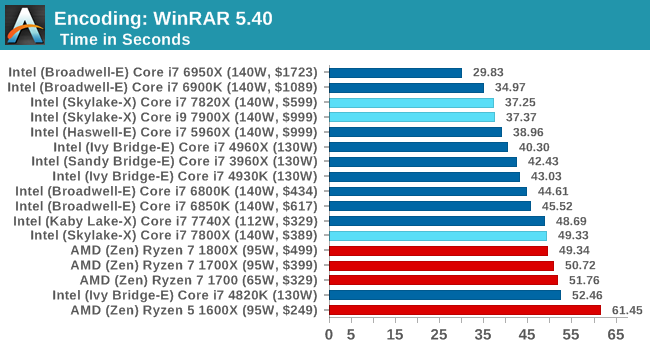
WinRAR loves having access to all the caches as much as possible, to prefetch and store data as needed. The Skylake-X chips fall back a bit here, even with DDR4-2666 support. The Core i7-7800X uses DDR4-2400 memory, so puts it further behind. Interesting didn't realise that the lower core count Broadwell-E chips were affected so much by this test, and the higher core count Ivy Bridge-E parts are faster here.
AES Encoding
Algorithms using AES coding have spread far and wide as a ubiquitous tool for encryption. Again, this is another CPU limited test, and modern CPUs have special AES pathways to accelerate their performance. We often see scaling in both frequency and cores with this benchmark. We use the latest version of TrueCrypt and run its benchmark mode over 1GB of in-DRAM data. Results shown are the GB/s average of encryption and decryption.
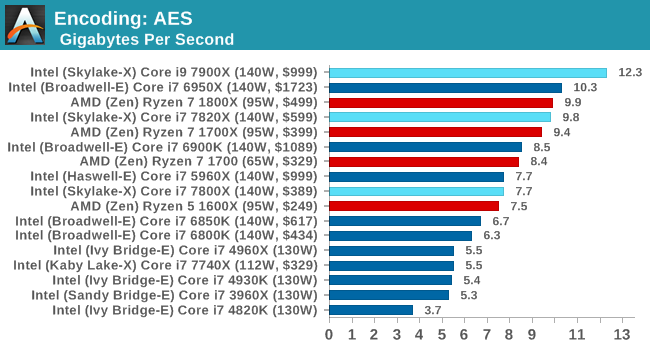
7-Zip
One of the freeware compression tools that offers good scaling performance between processors is 7-Zip. It runs under an open-source licence, is fast, and easy to use tool for power users. We run the benchmark mode via the command line for four loops and take the output score.
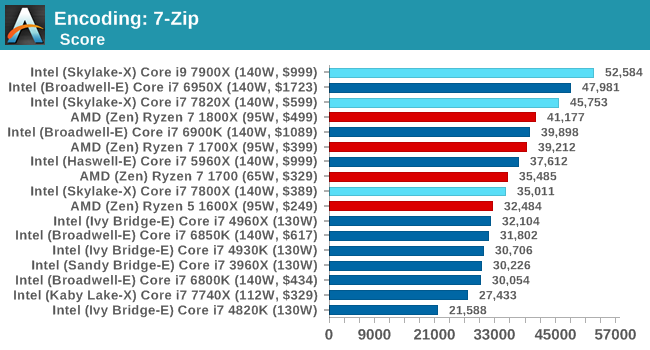










264 Comments
View All Comments
rascalion - Monday, June 19, 2017 - link
Are the Ryzen numbers in the charts retests using the last round of bios and software updates?Ian Cutress - Monday, June 19, 2017 - link
As much as possible, the latest BIOSes are used.Our CPU testing suite is locked in for software versions as of March 2017. This is because testing 30/50/100+ CPUs can't be done overnight, we have to have rigid points where versions are locked in. My cycle is usually 12-18 months. (Note I'm only one person doing all this data.)
FreckledTrout - Monday, June 19, 2017 - link
Ian any chance once there are a few BIOS tweaks you could say do a mini updated review on the 7820x vs Ryzen 1800x. With Ryzen having latest BIOS as well plus 3200Mhz memory. I'm just curious really how the 8-core guys line up when some of the dust settles and I think a lot of people will be.Ian Cutress - Monday, June 19, 2017 - link
Any reason why 3200? I'll have Intel people saying it is pushing the Ryzen out of specjjj - Monday, June 19, 2017 - link
You could do a memory subsystem scaling review for all platforms, Skylake X, Threadripper, Ryzen (Summit Ridge) and Coffee Lake. Cache, interconnect, DRAM. See where they are, how they scale, where the bottlenecks are, single rank vs dual rank modules and perf impact in practice.Why not even impact on power and efficiency.In any case, you'll need to update Ryzen 5 and 7 results when Ryzen 3 arrives , isn't it?
For DRAM at 3200 it might be out of spec - overclocking the core is out of spec too but that has never stopped anyone from overclocking the memory. Right now 3200 is what a lot of folks buy , at least for higher end mainstream Ofc some will argue that Ryzen scales better with memory and that's why it is unfair but it's a hell of a lot more reasonable than testing 1080p gaming with a 1080 TI since it's a popular real world scenario.
At the end of the day the goal should be to inform, not to watch out for Intel's or AMD''s feelings.
vanilla_gorilla - Monday, June 19, 2017 - link
>For DRAM at 3200 it might be out of spec - overclocking the core is out of spec too but that has never stopped anyone from overclocking the memory.This. Exactly. We're enthusiasts and we always push the envelope. No one cares what the specs are all we care is about what these processors are capable of in the right hands.
And Ian I think you guys do an awesome job, there's no other place I look for CPU benchmarks. Keep up what you do, we all appreciate it, as well as your willingness to have a dialog with us about the process. Really cannot say how impressed I am by how open and engaged you are, it's really commendable.
Ian Cutress - Tuesday, June 20, 2017 - link
Thanks for the comments :)Though on your comments about pushing things out of spec. We have a good deal of readers who want plain stock for their businesses - AT isn't solely a consumer focused site. Otherwise I'd just jack all the CPUs and just post OC results :D Our base testing will always be at stock, and for comparison testing there has to be an element of consistency - testing an OC'ed part against a stock part in a direct A vs B comparison is only going to end up with a barrage of emails being rammed down my throat. There has to be some planning involved.
Ian Cutress - Tuesday, June 20, 2017 - link
I've been planning a memory scaling article, I just haven't had the time (this article was around 6 weeks of prep with all the events going on that I had to attend).Note we don't retest stuff every review. With our new 2017 test suite, I've been going through regression testing. Usually regression testing is done once for the full segment until the benchmarks are changed again. I'll look at my next few months (still stupidly busy) and look at the priorities here.
FreckledTrout - Monday, June 19, 2017 - link
Most people can easily buy a 3200 kit for not a lot of extra money. It doesn't take a lot tweaking(well not anymore on AGESA 1.0.0.6) or silicone lottery like an OC, just a bit more cash. From what I have seen with Ryzen it is the sweet spot on price and performance. I would assume Its likely the most chosen configuration on the R7's. To make it fair use 3200 on the 7820x as well. I only ask because Ryzen did way better than I would have thought and would like to see it with 3200Mhz memory and latest updates to see really how close Intel and AMD are on 8-core systems. Then im going to build :)tipoo - Monday, June 19, 2017 - link
Launch review! Nice work dude(s).